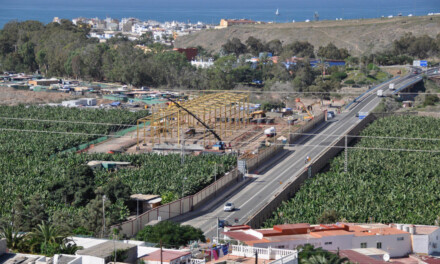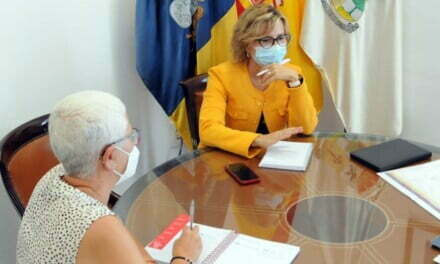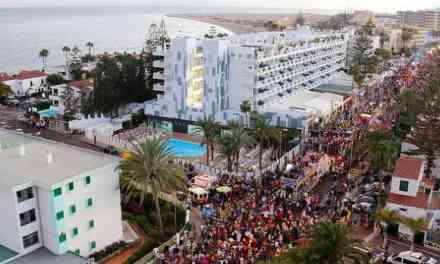 So far, Tenerife has detected an accumulated total of 219 cases; on Gran Canaria, 97; on La Gomera, 3; on La Palma, 11; on Lanzarote, 4; on Fuerteventura, 13 and on El Hierro, 1.
So far, Tenerife has detected an accumulated total of 219 cases; on Gran Canaria, 97; on La Gomera, 3; on La Palma, 11; on Lanzarote, 4; on Fuerteventura, 13 and on El Hierro, 1.
On Friday, the first case was confirmed on El Hierro, admitted and isolated at the Virgen de los Reyes de Valverde Hospital. While this morning a new case of coronavirus has also been confirmed on Lanzarote.
Nine deaths linked to coronavirus infection have been reported as of 8:00 p.m. this evening, by the Canary Islands Government Ministry of Health. Two more deaths this Saturday, one on Gran Canaria and the other on Tenerife, in addition to the seven registered over recent days. Friday reporting closed with five deaths, which were joined by two new ones that occurred on the island of Gran Canaria on Friday before midnight .
In total, the Archipelago has confirmed 348 cases of Covid-19, 66 more than on Friday and 127 more than last Thursday.
Regarding deaths:
On Tenerife: three at the Nuestra Señora de La Candelaria University Hospital and in all cases older citizens with previous pathology, one also at the Canarias University Hospital (a 34-year-old woman with a previous condition).
On Gran Canaria: One at the Doctor Negrín University Hospital, a woman over 80 years old with a previous underlying condition; and two deaths at the Insular Maternity and Children’s University Hospital Complex, an elderly woman and an 80-year-old man, both with previous pathologies.
Official statistics reporting from the Ministry of Health closes between 8:00 and 9:00 p.m. the day before and cases after that time are not included as official until the following day’s close.
The Ministry of Health finds 348 accumulated cases of COVID-19 coronavirus in the Canary Islands. Of these, 139 have required hospitalization. Of these hospitalized cases, they have required an ICU, 29. The last report closed at 9:00 p.m. on Friday also confirms 7 discharges and 7 deaths.
| 03/16/2020 | 03/17/2020 | 03/18/2020 | 03/19/2020 | 03/20/2020 | |
| TOTAL | 148 | 181 | 220 | 287 | 348 |
| TENERIFE | 92 | 119 | 143 | 194 | 219 |
| GRAN CANARIA | 36 | 45 | 55 | 70 | 97 |
| LA GOMERA | 3 | 3 | 3 | 3 | 3 |
| THE PALM | 5 | 5 | 5 | 5 | 11 |
| LANZAROTE | 7 | 3 | 3 | 3 | 4 |
| FUERTEVENTURA | 6 | 6 | 11 | 12 | 13 |
| EL HIERRO | 0 | 0 | 0 | 0 | 1 |
| LA GRACIOSA | 0 | 0 | 0 | 0 | 0 |
As novelties to increase the efficiency of sample collection in Tenerife, an external testing point has been installed at the Guajara Campus along with two more points. One in the South of Tenerife with the same vehicle arrival system and one in the North of the island. It is important to note that the results of the tests will be given to those affected by telephone but that it is not necessary to call any of the enabled telephones because there is a risk of collapsing them and making people who need it unable to receive care.
The Ministry of Health continues to study all cases likely to be positive, in this sense they have appealed to those who recently travelled from Tenerife with Imserso to the Basque Country and Galicia to contact the phone number 900 112 061 because they are cases that have tested positive from among these travellers, and the aim is to rule out more infections in this particular risk group.
Coronavirus hotline
For the sake of better care, the population is asked to use resources rationally. The coronavirus service telephone number enabled by the Ministry of Health is 900 112 061. This line has been supplied with medical professionals and other call handlers to assist all those who have symptoms (such as cough, fever, headache, etc.) and who have been in contact with people who may have traveled to risky areas such as Madrid, the Basque Country or Italy. From that phone line the testing will be assessed and managed.
The 1-1-2 number is for emergencies only.
Need to donate blood
The Canary Islands Institute of Hemodonation and Hemotherapy (ICHH) have reiterated the importance of donating blood in order to maintain the necessary reserves for health needs as blood expires and demand is expected to increase in the coming days.
*Remember any who lived for more than 6 months in the UK between 1980 and 1996 are not accepted blood donors due to bovine health scares in those countries.














